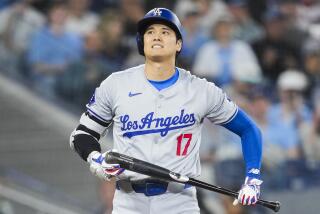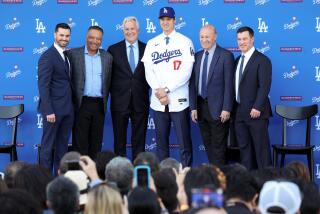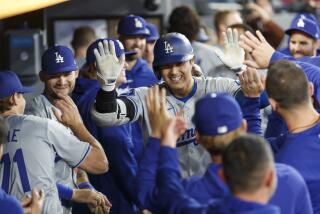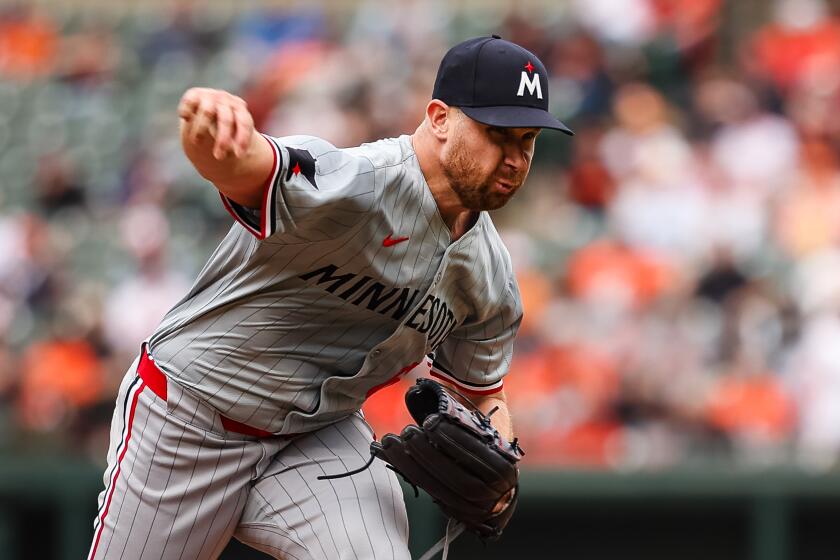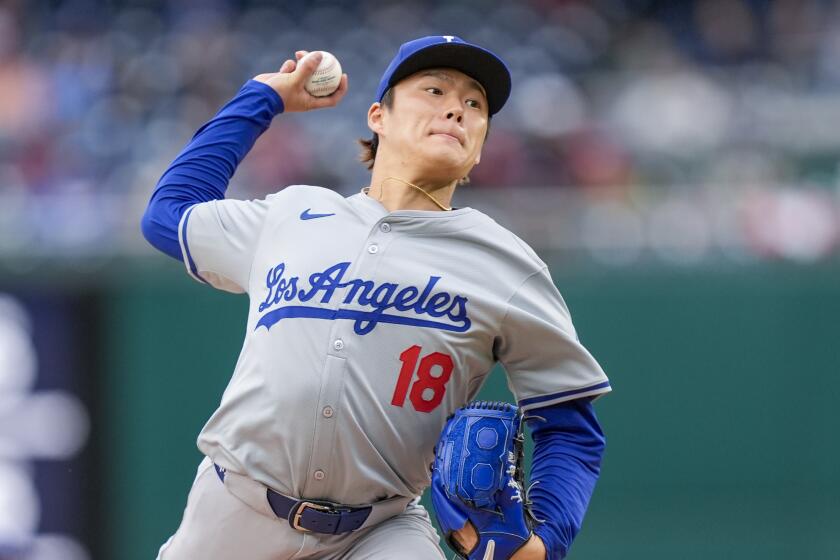Baseball scrambles for fans in China
Leadoff batter Peng Zixuan has been playing baseball all of four months, and his stance is a bit wobbly. But after a few swings, he smacks an infield single past the mound and eventually rounds the bases to score the first run of the game.
Zixuan is more than an enthusiastic 10-year-old. He embodies the hope and future of Major League Baseball in China, which is holding its first games here this weekend, between the Dodgers and the Padres. Zixuan and his teammates plan on attending.
This seed program at Beijing’s Fengtai Elementary School #1 is part of an ambitious Major League Baseball plan to expose 100,000 elementary school students in five cities to a sport that many Chinese find complicated and equipment-laden, in a nation where balls are more often kicked or bounced than whacked with a bat.
Despite its success in Japan, South Korea and Taiwan, baseball faces an uphill battle in this country of 1.3 billion, many of whom are increasingly affluent consumers. Soccer and basketball have a big head start, and football, wrestling, tennis, cricket and rugby are all bucking for a foothold. NASCAR is sniffing around. And hockey hasn’t ruled out a play down the road.
“It’s kind of a land grab now that harkens back to the gold rush,” said Paul Swangard, head of the University of Oregon’s sports marketing center. “There are a lot of prospectors seeing if they can find a vein.”
Many of the newcomers also underestimate the amount of cash, patience and political connections it takes to succeed in this market, analysts added.
Even Zixuan’s long-term loyalty isn’t assured. As soon as the half-inning game wrapped up Wednesday, he and his teammates ran off joyfully to play soccer. “I really don’t know any American baseball players,” he said. “My hero is Yao Ming,” the Houston Rockets basketball star from China.
This weekend’s games will be played at the new Wukesong stadium, built for the Aug. 8-24 Beijing Olympics. On Thursday, workers painted the stands and hung Dodgers and Padres flags at the 12,000-seat venue.
The jet-lagged Dodgers arrived late Thursday from their training camp in Vero Beach, Fla. They’ll work out today before the exhibition games Saturday and Sunday (10 p.m. PDT tonight and Saturday). “You want to hope you light a fire that starts a burning passion for baseball,” said Charles Steinberg, the Dodgers’ executive vice president of marketing. “If that happens, those that count the money will have their day.”
That day could produce a windfall for those who get it right. Though some estimates place the Chinese sports market at about $10 billion a year, a fraction of America’s $300 billion, that’s tripled over the last decade and is expected to continue growing rapidly, according to Terry Rhoads, co-founder of Shanghai-based Zou Marketing, which is running the Major League Baseball youth program, called Play Ball!
‘Weird economics’
For sponsors, sports is also an excellent way to reach 16- to 30-year-old Chinese, a market of about 400 million people eager to buy the shoes, shirts, cellphones and milk products their sports stars hawk.
“It’s weird economics,” said Andrew Messick, international marketing head with Staples Center owner AEG. “In China, the 50-year-olds aren’t the ones with the money, it’s the 25-year-olds.”
Promoters of the game say baseball suits the Chinese physique and character with its emphasis on agility and teamwork over size. Analysts also give Major League Baseball points for the ambitious grass-roots school program, important in building a fan base from scratch. The league is training coaches, working with sports and education authorities and has donated thousands of bats, balls and gloves to participating schools.
But baseball faces huge challenges in China, including some shared by other sports. Perhaps most fundamentally, there are relatively few soccer fields, and almost no baseball diamonds. Even the Wukesong baseball facility is reportedly set to be razed after the Olympics.
“It’s a problem,” said Zhang Heng, a retired Chinese sports official. “And in Beijing, a lot of real estate developers fight to take over the fields we have.”
Though Major League Baseball eventually hopes to build diamonds on its own dime, Zixuan and most other youngsters in the Play Ball! program now use soccer fields. One of the reasons the program targets elementary school students, organizers said, is because they can’t hit the ball very far and thus could play in smaller fields.
Baseball also will no longer be an Olympic sport after 2008. This makes it a low priority in China’s Soviet-style system, which funnels promising youngsters into special camps that train them relentlessly for gold medals and national glory.
And many Chinese find baseball complicated. “I don’t really understand a lot of the rules,” acknowledges Wang Qingli, Zixuan’s coach. “But I’ve tried to study on the Internet.”
Major League Baseball says it will follow the NFL, which faces the same problem, in broadcasting tightly edited games, holding tutorials and simplifying the game for beginners. “We may be America’s most popular sport by far, but that doesn’t mean anything in China,” said Michael Stokes, the NFL’s China representative.
Major league officials say they’re aware of the difficulties but are in it for the long haul. “We don’t have any illusions,” said Paul Archey, the league’s senior vice president of international operations. “We don’t expect to play two games and see everything change overnight.”
Getting the guanxi right
As soccer has lost momentum in the country in recent years -- the victim of corruption scandals and poor results, including China’s defeat by Kuwait -- basketball is emerging as the model for newcomers.
The game is simple to play and understand and uses little equipment. And Yao has ignited Chinese interest in the NBA.
In many ways, however, the NBA is reaping the dividends of a broader effort that goes back decades. The league has been broadcasting games locally for 20 years and has developed scores of school programs over many years amid claims that 300 million people play the game here.
It’s also built up important government contacts over many years, nurtured guanxi, or connections, and paid lots of bills. “When we took the Rockets and the [Sacramento] Kings to Shanghai in 2004, we had to bring in the seats, the floor, the locker room,” said Heidi Ueberroth, the NBA’s international marketing head. “I’d emphasize the importance of very long-term relationships.”
An example of what happens when you don’t get your guanxi right was seen in the NFL’s failed bid to bring the New England Patriots and the Seattle Seahawks here in 2007.
Officially the game was canceled because the Beijing stadium wasn’t ready and the NFL decided to focus on a season-opening game in London. But insiders say in fact the league announced the game before winning approval of Chinese sports officials, who decided to teach the NFL a lesson.
A long history
Major League Baseball isn’t disclosing what its China budget is or how long it’s willing to wait for a return on its investment, but it’s almost certainly outgunned by the NBA, which has a $250-million war chest, four offices in China with 100 employees and capital in reserve.
Baseball has a long history in China, having arrived in 1872 at the hands of returning students, said Cui Leguan, a researcher at the China Sports Museum. But it was condemned during the Cultural Revolution as an American imperialist sport, whereas basketball and soccer were seen as more international sports.
“The game took a hiccup when Mao Tse-tung came along,” said Tom McCarthy, head of the sports marketing firm Beijing International Group.
China has a long record of frustrating starry-eyed foreign businessmen who underestimate the impediments, convinced they can make a fortune. In the end, analysts say, which sport succeeds and which doesn’t depend in large part on how long the leagues can hold out and how much pain they can tolerate.
In the meantime, Major League Baseball has its work cut out for it.
“The Dodgers? Never heard of them,” said Shang Hongwei, a 23-year-old hotel manager shooting hoops near Tiananmen Square. “But I follow the Rockets closely and understand [Chinese star] Yi Jianlian just joined the [Milwaukee] Bucks. I really love the NBA.”
--
--
Wu Yixiu of The Times’ Beijing Bureau contributed to this report.
More to Read
Are you a true-blue fan?
Get our Dodgers Dugout newsletter for insights, news and much more.
You may occasionally receive promotional content from the Los Angeles Times.
